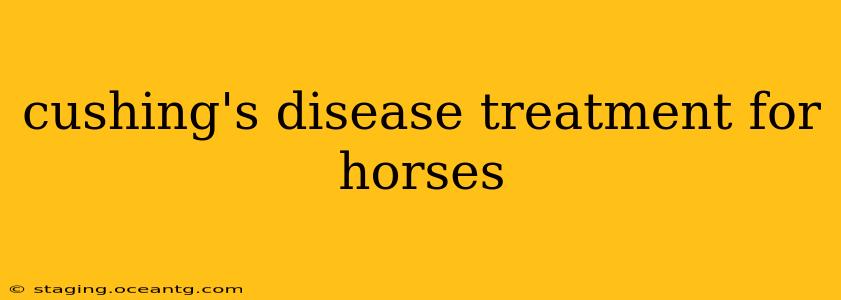Cushing's disease, also known as equine pituitary pars intermedia dysfunction (PPID), is a hormonal disorder affecting older horses. Characterized by an overproduction of cortisol, it significantly impacts a horse's health and well-being. This comprehensive guide explores the various treatment options available for managing Cushing's disease in horses, helping owners and veterinary professionals make informed decisions.
What are the common symptoms of Cushing's disease in horses?
Recognizing the signs of Cushing's disease is crucial for early intervention. Common symptoms include a long, shaggy coat that doesn't shed properly, muscle wasting, increased thirst and urination (polydipsia and polyuria), and a pot-bellied appearance. Horses with Cushing's often exhibit lethargy, recurrent infections, and impaired wound healing. Some may also develop laminitis (inflammation of the sensitive laminae within the hoof). It's important to note that these symptoms can also be indicative of other health problems, making accurate diagnosis essential.
How is Cushing's disease diagnosed in horses?
Diagnosis typically involves a combination of clinical examination, evaluating the aforementioned symptoms, and blood tests. The most common diagnostic test measures the levels of adrenocorticotropic hormone (ACTH) in the blood. Elevated ACTH levels strongly suggest Cushing's disease. Additional tests might be necessary to rule out other conditions and assess the severity of the disease.
What are the treatment options for Cushing's disease in horses?
Currently, there's no cure for Cushing's disease in horses, but effective treatments significantly improve the horse's quality of life and manage the symptoms. The primary treatment focuses on managing the excessive cortisol production. The most common medication is pergolide.
Pergolide: The cornerstone of Cushing's disease treatment
Pergolide is a dopamine agonist that helps to regulate the production of ACTH, thus reducing cortisol levels. It's generally well-tolerated, but some horses may experience side effects such as mild gastrointestinal upset. Regular monitoring by a veterinarian is essential to adjust the dosage as needed and track the effectiveness of the treatment.
Other management strategies:
Beyond medication, supportive care plays a vital role in managing Cushing's disease. This includes:
-
Dietary adjustments: A well-balanced diet is crucial. This might involve adjustments to carbohydrate intake to help manage weight and insulin resistance, which are frequently associated with Cushing's. Dietary fiber can also be beneficial.
-
Regular hoof care: Because laminitis is a common complication of Cushing's, meticulous hoof care is essential. Regular trimming and farrier visits are crucial for maintaining hoof health.
-
Addressing secondary infections: Horses with Cushing's are more susceptible to infections. Prompt veterinary attention is vital to treat any infections effectively.
-
Monitoring and adjustments: Regular veterinary check-ups are necessary to monitor the effectiveness of the treatment, adjust medication dosage as needed, and address any emerging health concerns.
What is the prognosis for horses with Cushing's disease?
With proper management and veterinary care, horses with Cushing's disease can live relatively long and comfortable lives. The prognosis varies depending on the severity of the disease and the individual horse's response to treatment. Regular monitoring and prompt treatment of any complications are crucial for optimizing the outcome.
What are the long-term effects of Cushing's disease in horses if left untreated?
Untreated Cushing's disease can lead to progressive deterioration of the horse's health. This may include severe laminitis, recurrent infections, debilitating muscle weakness, and ultimately, reduced quality of life and potentially premature death. Therefore, early diagnosis and prompt treatment are essential to mitigate these risks.
Are there any alternative therapies for Cushing's disease in horses?
While pergolide remains the gold standard, some alternative therapies may complement the conventional treatment. These are often used in conjunction with medication and should always be discussed with your veterinarian. Examples might include specific herbal remedies or nutritional supplements. However, their effectiveness varies significantly, and scientific evidence supporting their use is often limited.
This information is for educational purposes only and should not be considered veterinary advice. Always consult with a qualified equine veterinarian for diagnosis and treatment of Cushing's disease in your horse. They can provide personalized guidance based on your horse's individual health status and needs.
